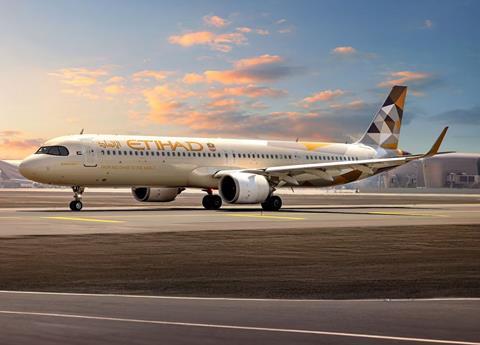
Etihad Airways has completed a significant acquisition, finalizing a deal for 16 aircraft engines at a total cost of Dhs1.5 billion. This move is part of the airline’s strategy to modernize its fleet and enhance operational efficiency. The engines, produced by prominent manufacturers, are set to be deployed across a range of aircraft, bolstering Etihad’s capacity to meet growing passenger demand.
The airline’s investment aligns with its long-term vision to improve sustainability and operational performance. By integrating advanced engine technology, Etihad aims to reduce fuel consumption and lower emissions, supporting the aviation industry’s transition to greener practices. The new engines are expected to provide enhanced reliability and performance, which is crucial in today’s competitive aviation market.
In a statement, the airline highlighted that this acquisition represents a commitment to maintaining a state-of-the-art fleet capable of delivering exceptional service. The engines will replace older models, ensuring that the airline can operate more efficiently and offer improved services to its customers. Etihad has emphasized the importance of modernizing its fleet in response to changing market dynamics and customer expectations.
Industry experts view this acquisition as a proactive step for Etihad Airways, especially in light of the increasing competition within the Middle East aviation sector. As regional carriers expand their fleets and services, having access to the latest engine technology will provide Etihad with a competitive edge. This investment is expected to position the airline favorably for future growth opportunities.
Etihad Airways has been on a trajectory of renewal and transformation, having previously committed to investments in other aspects of its operations, including upgrading cabin interiors and enhancing passenger services. The recent engine purchase is just one component of a broader strategy aimed at improving overall operational capabilities and customer experience.
The airline’s focus on sustainability is reflected in its efforts to adopt more fuel-efficient aircraft and reduce its carbon footprint. As airlines globally face increasing pressure to meet environmental standards, Etihad’s decision to invest in modern engines is a clear indication of its commitment to sustainable aviation. The new engines will contribute to lower emissions per flight, aligning with international environmental goals.
With the global aviation market showing signs of recovery post-pandemic, the demand for air travel has surged. Etihad Airways is responding to this upturn by expanding its fleet and enhancing its service offerings. The acquisition of these engines will support the airline’s ability to operate more flights and routes, ultimately catering to an expanding customer base.
Etihad’s strategy also involves collaborating with industry leaders to ensure that its fleet remains at the forefront of technological advancements. By investing in next-generation engines, the airline not only enhances its operational efficiency but also secures long-term partnerships with leading manufacturers, fostering innovation and growth within the aviation sector.
The Middle East’s aviation market has been evolving rapidly, with airlines in the region seeking to capitalize on increased travel demand. Etihad Airways, along with other major carriers, is focusing on strategic investments to bolster its position in this competitive landscape. As travel continues to rebound, airlines are prioritizing fleet modernization and operational excellence, and Etihad’s recent purchase exemplifies this trend.
Analysts predict that the demand for air travel will continue to rise, driven by economic growth, tourism, and increased connectivity between global cities. Etihad Airways is positioning itself to capture this demand effectively through its fleet expansion and modernization initiatives. The acquisition of the 16 engines marks a critical step in preparing for the future of aviation in a post-pandemic world.
The engines’ integration into Etihad’s fleet is expected to occur over the coming months, with a strategic rollout plan that emphasizes efficiency and reliability. The airline’s technical teams will work closely with manufacturers to ensure a seamless transition and optimal performance from the new engines.
As Etihad Airways moves forward with this ambitious acquisition, it underscores the airline’s resilience and commitment to maintaining a leading role in the Middle East aviation market. The investment in modern aircraft engines reflects a broader trend among airlines worldwide to enhance fleet performance and sustainability, ensuring that they are well-equipped to meet the demands of a rapidly changing travel landscape.



